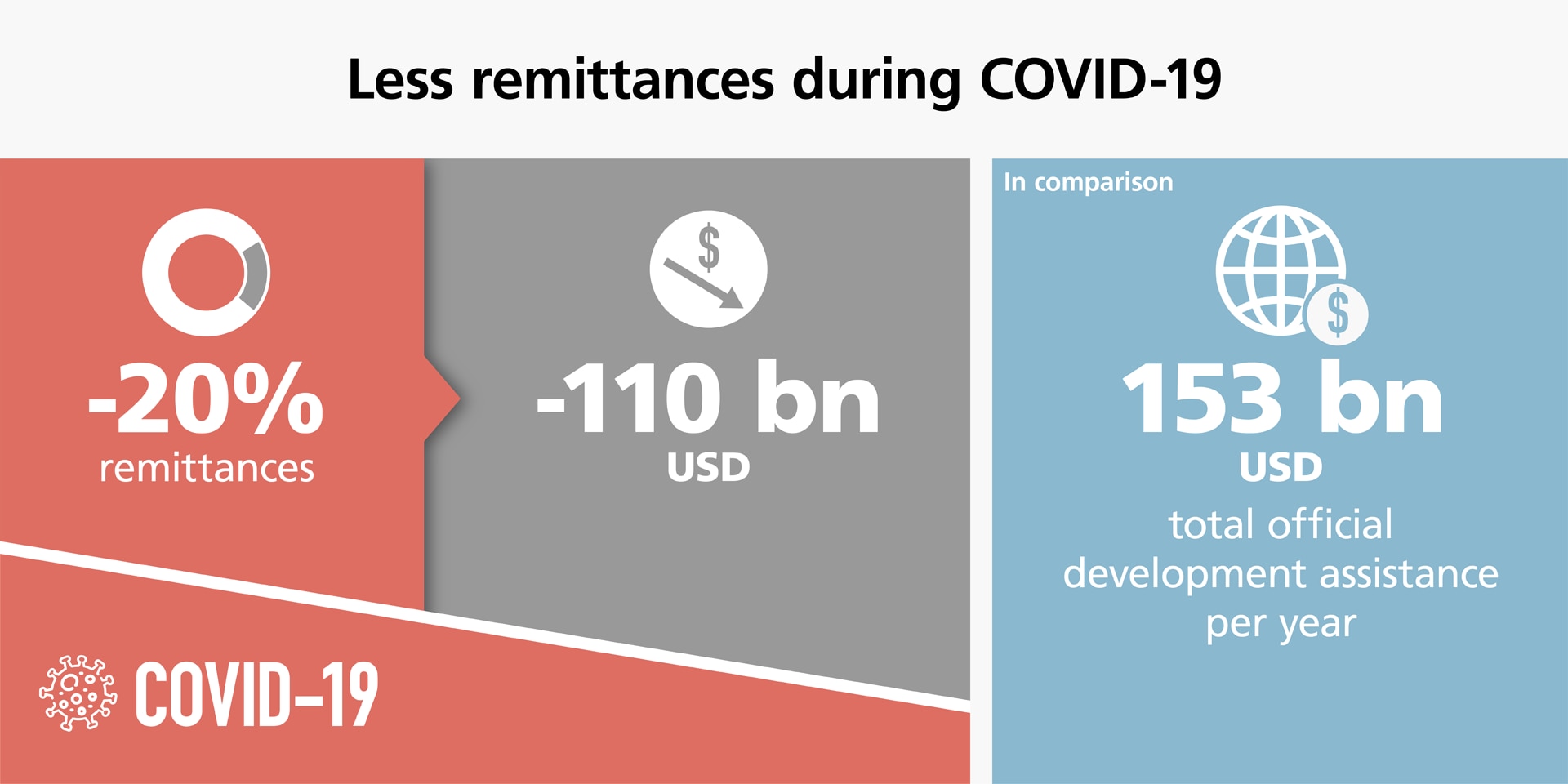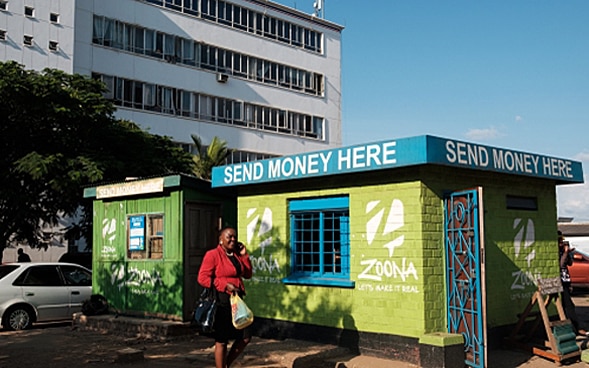Switzerland launches appeal to mitigate sharp decline in remittances to low-income countries
Discussions on the negative effects of the COVID-19 pandemic on low-income countries have gained considerable momentum. Remittances from migrants and wider diaspora communities to their countries of origin are a key issue in this respect. Switzerland is therefore launching an appeal to keep remittance channels open and give the poorest communities continued access to these vital sources of income.

Because of the current COVID-19 pandemic, low-income countries have seen a dramatic fall in remittances from abroad. © FDFA
Remittances sent by migrant workers to their families in their countries of origin have reached record levels in recent years. According to the latest World Bank figures, migrant remittances to developing countries reached a record high of USD 529 billion in 2018. They are expected to have risen to USD 550 billion in 2019. These funds play an increasingly important role in developing countries' economies. In Tonga, Kyrgyzstan, Tajikistan, Haiti and Nepal remittances now account for or even exceed 25% of GDP.
Sharp drop in remittances

The significant decline in remittances poses a major challenge. For some time now, developing and emerging countries have seen a dramatic fall in the inflow of remittances from abroad. The flow of global remittances to low- and middle-income countries is projected by the World Bank to decline sharply by about 20% – by USD 110 billion – in 2020, compared with total global official development assistance of USD 153 billion in 2019. The reason is clear: the COVID-19 crisis. This fall in remittances, the steepest in recent history, is mainly due to the fact that migrant workers are particularly vulnerable to wage reductions and job cuts in their host countries. Lockdown restrictions and the closure of foreign exchange and cash transfer agencies also make it difficult, if not impossible, for migrant workers to send money home. Many agents currently lack the liquidity to continue operating.
Essential source of income for poor countries
Remittances from migrants and wider diaspora communities to their countries of origin have become a cornerstone of many economies around the world, alleviating poverty, improving nutrition, enabling more spending on education and reducing child labour among disadvantaged families. They are a lifeline when other sources of income dry up. Efforts to mitigate the sharp drop in remittances are also in line with the Sustainable Development Goals of the UN's 2030 Agenda and Switzerland's International Cooperation Strategy 2021–24. Federal Councillor Ignazio Cassis notes that remittances are important, but difficult because of COVID-19. “So let's make sure those barriers are removed worldwide! New technologies can help us here."
Joint appeal by Switzerland and the United Kingdom
Because of its long-standing experience in migration and development and its expertise in the field of remittances, Switzerland recognised the urgency of the situation and decided to launch, together with the United Kingdom, several multilateral development organisations and the International Association of Money Transfer Networks (IAMTN), an international appeal to address the sharp fall in remittances to low-income countries. The appeal aims to ensure the unhindered flow of remittances during the COVID-19 pandemic in order to allow the families of migrant workers to continue to receive this vital income and avoid falling into poverty.
Specifically, the call to action aims to provide migrant workers' with additional options, including digital technologies and digital channels, to enable them to continue to send money home. It calls on policymakers, regulators and service providers worldwide to make it easier to transfer money abroad by easing regulatory and licensing requirements and providing financial incentives, such as temporarily reducing remittance transaction costs and systematically recognising remittance agencies as essential services. Finally, it plans to use information campaigns to raise migrants' awareness of new ways of sending money home, including digital transfer options.
Switzerland to develop customised financial services
Switzerland has declared its commitment to facilitating remittance transfers by supporting the development of financial services specifically adapted to the needs of migrants. These services will rely on new technologies to provide solutions for transferring money abroad, for instance via mobile phone, as well as microinsurance and savings schemes, particularly for retirement plan options. Migrant workers will have the option of sending money home and investing their savings in a scheme of their choice with just a click.
The economic hardship caused by the COVID-19 pandemic are seriously undermining the ability of migrants and wider diaspora communities to send money home. This is why Switzerland is promoting new digital solutions to ensure the continued flow of remittances.
Strategy for International Cooperation 2021–24
In accordance with the Federal Constitution and Swiss law, the Federal Council and Parliament set the course of Switzerland's international cooperation every four years. The Dispatch on Switzerland's Strategy for International Cooperation 2021–24 was adopted by the Federal Council on 19th February 2020. It commits Switzerland to working towards a safe and peaceful world where everyone can live free from want and fear, have their human rights protected and enjoy economic prosperity. This priority is all the more critical in the context of the COVID-19 pandemic. Remittances help to alleviate need and reduce poverty, strengthen respect for human rights, promote democracy and protect the environment.
Agenda 2030
On the 25th September 2015, the 193 UN member states adopted the 2030 Agenda for Sustainable Development. The 2030 Agenda, which has been in force since 2016, provides a universal reference framework for sustainable development formulated in 17 Sustainable Development Goals (SDG). The UN's member states have pledged to take the necessary steps to jointly achieve these goals by 2030. Switzerland is also expected to achieve these objectives at the national level. Remittances play a significant role in achieving the goals that Switzerland has set for itself to meet urgent global challenges.
